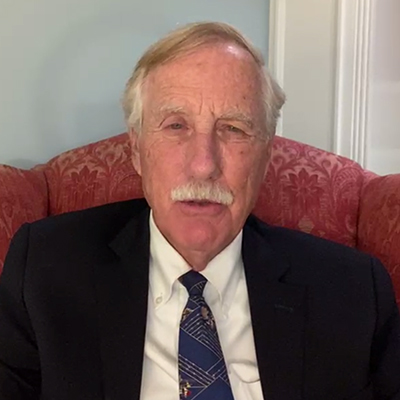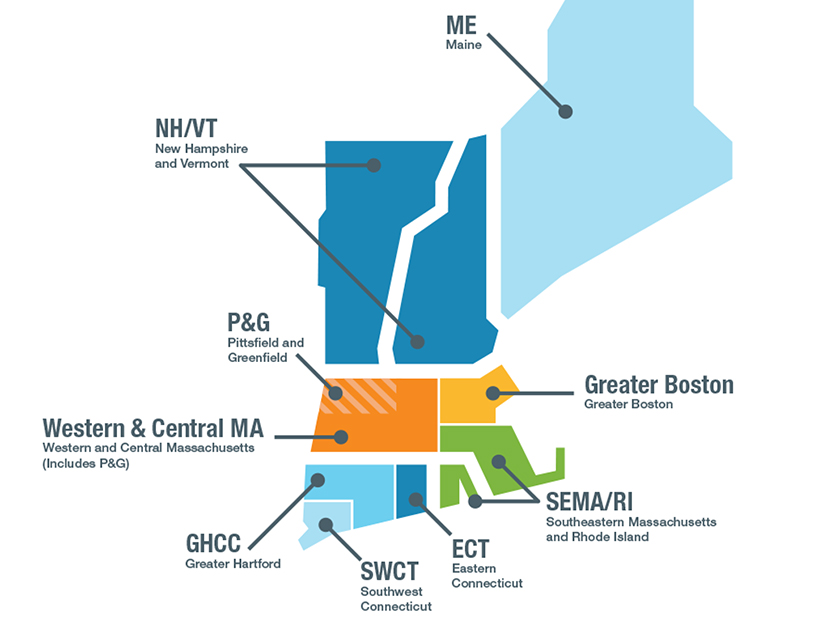ISO-NE hosted a virtual public forum on Wednesday to discuss its draft 2021 Regional System Plan (RSP), which generally uses a 10-year planning horizon to estimate the need for energy resources.
However, several studies are underway looking beyond 10 years to assess reliability with a decarbonized grid. Planning is also necessary for a future grid that is prepared to respond to extreme incidents like calamitous weather or cybersecurity events.
Here is some of what we heard during the forum.
Storage, Cybersecurity Keys for King

King said the key to decarbonizing the power grid with 80% of electricity coming from renewables by 2030 is long-duration battery storage.
“I think the single biggest step is storage,” King said. “That’s the thing that is most important and allowing us to go to a decarbonized future.”
King said he does not see a limit to wind and solar technology, which is “improving daily; as their efficiency is going up, their cost is going down dramatically.” Instead, the problem is what fills in the gaps.
“Storage is the real Green New Deal,” King said. “If we can deal with that issue and can come up with the technology for grid-scale, long-duration storage, then we are well on our way to a decarbonized future.”
The grid of the decarbonized future also needs protection from bad cybersecurity actors. King said Russia and China were maliciously working to gain access to New England’s power grid as he spoke at the forum.
“I can guarantee you, right now at this very moment, there’s somebody in Moscow or St. Petersburg or Beijing or Shanghai working on how to penetrate ISO-NE; how to plant malware; how to create the opportunity to get in our data systems, to get in our transformers,” King said. “This is the most significant national security challenge that we face right now. The next 9/11 will be cyber.”
King added that RTOs have done well at “being ahead of this problem,” though they “can’t ever stop.”
“This is a constantly evolving threat,” King said.
As co-chair of the Cyberspace Solarium Commission, King said he had spent the last three years establishing a national cybersecurity strategy.
“I can tell you this is a grave threat, and you’re the target,” King said. “We need to establish a new relationship between the federal government and the private sector because 85% of the targets are in the private sector.”
King said that the natural gas pipeline system is “not adequately protected.” Because more than 60% of New England’s electricity comes from natural gas, King said that if something happens to the pipeline system, “we’re offline.”
Panel Discusses Extreme Events
NERC CEO Jim Robb said during a panel discussion on preparing and responding to extreme events that there have been a “cascading series” of weather incidents that have impacted the power grid. However, the “granddaddy of them all” was in Texas last February when a winter storm caused the ERCOT system’s near collapse and long-term outages.
“These weather events impact not only generation availability and deliverability but also loads,” Robb said. That is the “triple whammy” of not knowing what loads are being served, not having the infrastructure to deliver it and not knowing whether the generation “is going to show up.”
“There’s going to be a new set of tools needed because I think we’ve tortured the ones we used for our grandfather’s electric systems about as far as they can go into the new world,” Robb said.
Bill Magness, the former CEO of ERCOT who was fired in the wake of the storm, said it led to the largest controlled load shed in U.S. history, but “we did keep the system under control.”
“While we had horrendous impacts on human life, on the economy … we were able to hold on to the system, not go into a blackout and come out of it with the system intact,” Magness said.
A big issue, according to Magness, was the freezing up of generation units.
“It was an extreme weather event, but being prepared for those worst cases is critical,” Magness said. “You can have the fuel, but if you don’t have the ability to run the plant, you’re not going anywhere.”
Henderson Remembered
During opening remarks, ISO-NE Director Vickie VanZandt paid tribute to Mike Henderson, the RTO’s former director of regional planning who died May 22, a little more than a year after his retirement. The meeting was dedicated to Henderson.
Much of Henderson’s tenure at ISO-NE focused on the creation and evolution of the RSP.
“Mike was at the heart of the regional and interregional planning process in New England from the late ’90s until his retirement last year,” VanZandt said. “From the first through RSP 19, Mike’s fingerprints were all over each of these reports.”
The RSP process, according to VanZandt, has been recognized by FERC as an example of how a regional planning process should be performed, which was a testament to Henderson’s passion for the project and his work overall, she said.



